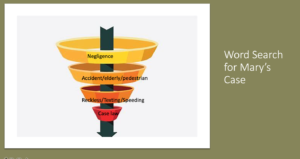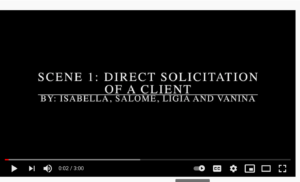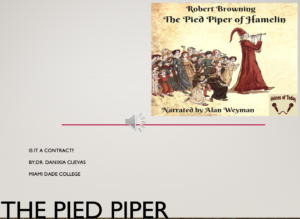For the past twenty-one years, I have taught full time as a tenured professor at Miami Dade College (MDC) in Miami, Florida. As a former practicing attorney, I have been able to transition successfully into academia and teach law and paralegal courses in the only American Bar Association (ABA) approved program at MDC. As an ABA approved program, our courses are rigorous and require practical implementation of legal theories. Additionally, teaching at one of the largest colleges in the U.S., with an enrollment of 120,000 students in a city like Miami with a large immigrant population, I have had the unique ability to implement innovative teaching pedagogy.
Faculty are well aware of the fact that students are both absorbed and adept with technology. They are accustomed to engaging and interactive stimuli. As academicians we can use this to our advantage to maximize our course delivery. Our teaching pedagogy can reflect interactive, active learning principles underscored by the use of diverse collaborative teaching pedagogy. We can “flip” the classroom and use class time to have students engage in practical skills which enable them to see how that they are learning will be relevant beyond the classroom.
In order to do this, we must utilize a myriad of engaging teaching pedagogy. Active teaching pedagogy can immerse our students in robust critical thinking exercises which forces them to think “outside of the box”. We can use project-based teaching pedagogy which require students to utilize real -world case scenarios which can underscore the practical skills that they will need as future attorneys and paralegals. For example, in my law classes students analyze fact patterns which form the basis of their coursework throughout the term. Depending on the class, students will participate in simulated client interviews, role playing; legal research and writing as well as drafting of all types of legal documents from the inception of the case throughout the trial.
During this pandemic, we have realized that we can deliver innovative, high quality and uninterrupted instruction maximizing the use of technology. Engaging teaching pedagogy enables our students to be active learners. In order to do so as faculty, we must deliver content in an engaging manner such as having students create visual depictions of legal concepts. Students’ creative projects can showcase innovative, critical thinking abilities as well as sound legal judgement. Faculty should teach legal concepts in a manner which will require students to fully immersed with the material, to nurture their own academic curiosity and creative spirit and take ownership of their own academic journey.
Example 1: Students creating a word search for legal research purposes

Example #2: Below is a screen shot of a video created by students regarding legal ethics
In yet another example, a professor can utilize children’s stories to teach legal principles. The Pied Piper is a well-known children’s story in America which can be utilized to teach complex legal principles requiring problem solving skills as well as collaborative learning principles. Students have created books, visual poster boards; 3-D models of accident scenes for their mock trials etc. Other students have created short films that depict legal concepts. Additionally, you can have your students teach the class for the day. You will be surprised how much students will learn from these seemingly simple yet powerful pedagogical principles. Yet another technique is to incorporate film clips and music in your lectures. I begin and end class with songs that resonates with the course material for that day including urban music. Students will connect with you as their professor and are drawn to your enthusiasm, thereby motivating them to be engaged and active participants in your class. Use group projects to sharpen collaborative skills that they will need in their real lives. This immersive pedagogy will enable students to develop team building skills; communication; critical thinking and innovative skills that will serve them well as future legal practitioners.
Example #3: The Pied Piper and Contract Law
Experiential learning also provides excellent opportunities for students. Students who engage in clinical and service- learning opportunities increase their understanding of the law and the importance of providing access to justice. Over the years, my students have participated in free legal clinics throughout the city of Miami in the areas of immigration, special education and domestic violence law. Academicians who engage in experiential learning, innovative and interactive teaching pedagogy, are confirming the academic integrity of the content which they are teaching. However, we are doing more than this, we are ensuring that students become life- long learners, talented attorneys, paralegals and critical thinkers. As educators, we will leave an indelible transformative mark on the lives of our students and young legal professionals.

